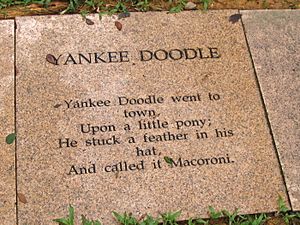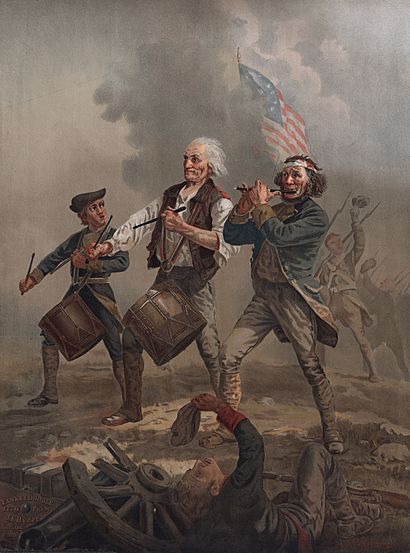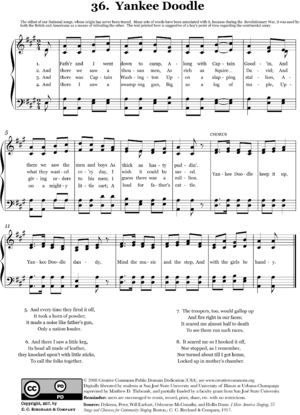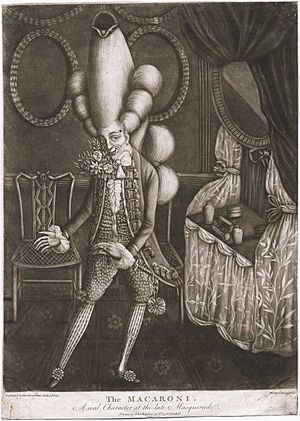Yankee Doodle facts for kids
Quick facts for kids "Yankee Doodle" |
|
|---|---|

The first verse and refrain of Yankee Doodle, engraved on the footpath in a park.
|
|
| Song | |
| Published | 1780s |
"Yankee Doodle" is a very famous American song. Its first versions appeared even before the Seven Years' War and the American Revolution. Today, people in the United States often sing it with pride. It is also the official state anthem of Connecticut. The song's tune is believed to be much older than its words. It might even come from folk songs in Europe from the Middle Ages.
Contents
The Song's Beginnings
The melody of "Yankee Doodle" is thought to be very old. It was well-known across many parts of Western Europe, including England, France, and the Netherlands. Some believe the tune came from an Irish song called "All the way to Galway." The first words of "Yankee Doodle" might have come from a Middle Dutch harvest song from the 1400s. This old song had some silly words in English and Dutch, like "Yanker, didel, doodle down."
The word Doodle first appeared in English in the early 1600s. It likely came from a German word meaning "playing music badly" or "fool."
What "Macaroni" Meant
The word Macaroni was used to describe a very fashionable man in the 1770s. These men, called dandies, cared a lot about their looks, spoke in fancy ways, and enjoyed hobbies like gambling. A "macaroni" wig was a very extreme and fancy hairstyle. It was part of a fashion trend popular among rich people in Europe. People in London often made fun of this style.
The term macaroni was used to describe a man who dressed and acted in an overly fancy way. When the British called someone a "Yankee doodle dandy," they were making fun of them. They meant that the person was unsophisticated and trying to look upper-class without really understanding fashion. It was like saying someone thought they were stylish just by sticking a feather in their hat. The British were suggesting that the American colonists were not refined and lacked proper manners.
Early Versions of the Song
"Yankee Doodle" was first sung by British military officers before the American Revolutionary War. They used it to make fun of the American colonial soldiers. These soldiers often looked messy and disorganized. The British sang it to mock the American soldier as a simple person who thought a feather in his cap made him stylish.
Dr. Richard Shuckburgh, a British Army surgeon, is believed to have written the original lyrics around 1755. He saw the colonial troops and found their appearance amusing. However, the Americans soon started singing the song themselves. They changed the words to make fun of the British troops instead. They also added verses praising George Washington, who led the American army. By 1781, "Yankee Doodle" had changed from an insult into a song of American pride.
One story says that Edward Bangs, a student at Harvard, wrote the current version of the song in 1776. He wrote a ballad with 15 verses that became popular in Boston.
After the Battles of Lexington and Concord, a newspaper in Boston reported something interesting. A British officer was asked how he liked the tune of "Yankee Doodle" after being chased by American Minutemen. He replied, "Dang them, they made us dance it till we were tired!" After that, the song didn't sound as sweet to British ears.
One of the earliest known versions of the lyrics is from around 1755 or 1758:
Brother Ephraim sold his Cow
And bought him a Commission;
And then he went to Canada
To fight for the Nation;
But when Ephraim he came home
He proved an arrant Coward,
He wouldn't fight the Frenchmen there
For fear of being devoured.
Another verse that British soldiers supposedly marched to tells a story about Thomas Ditson from Billerica, Massachusetts. British soldiers covered Ditson in tar and feathers because he tried to buy a gun in Boston in March 1775. He did get a gun later and fought at Concord. Because of this, Billerica is sometimes called the home of Yankee Doodle.
Yankee Doodle came to town,
For to buy a firelock,
We will tar and feather him,
And so we will John Hancock.
"Yankee Doodle" was even played when the British surrendered at Saratoga in 1777.
The Full Song Today
| The Spirit of '76 (aka Yankee Doodle) | |
|---|---|
 |
|
| Artist | Archibald MacNeal Willard |
| Year | circa 1875 |
| Type | oil |
| Dimensions | 61 cm × 45 cm (24 in × 18 in) |
| Location | United States Department of State |
Here is the full version of the song as many people know it today:
Yankee Doodle went to town
A-riding on a pony,
Stuck a feather in his cap
And called it macaroni.
[Chorus]
Yankee Doodle keep it up,
Yankee Doodle dandy,
Mind the music and the step,
And with the girls be handy.
Father and I went down to camp,
Along with Captain Gooding,
And there we saw the men and boys
As thick as hasty pudding.
[Chorus]
And there we saw a thousand men
As rich as Squire David,
And what they wasted every day,
I wish it could be savèd.
[Chorus]
The 'lasses they eat every day,
Would keep a house a winter;
They have so much, that I'll be bound,
They eat it when they've a mind to.
[Chorus]
And there I see a swamping gun
Large as a log of maple,
Upon a deuced little cart,
A load for father's cattle.
[Chorus]
And every time they shoot it off,
It takes a horn of powder,
And makes a noise like father's gun,
Only a nation louder.
[Chorus]
I went as nigh to one myself
As 'Siah's underpinning;
And father went as nigh again,
I thought the deuce was in him.
[Chorus]
Cousin Simon grew so bold,
I thought he would have cocked it;
It scared me so I shrinked it off
And hung by father's pocket.
[Chorus]
And Cap'n Davis had a gun,
He kind of clapt his hand on't
And stuck a crooked stabbing iron
Upon the little end on't
[Chorus]
And there I see a pumpkin shell
As big as mother's basin,
And every time they touched it off
They scampered like the nation.
[Chorus]
I see a little barrel too,
The heads were made of leather;
They knocked on it with little clubs
And called the folks together.
[Chorus]
And there was Cap'n Washington,
And gentle folks about him;
They say he's grown so 'tarnal proud
He will not ride without 'em.
[Chorus]
He got him on his meeting clothes,
Upon a slapping stallion;
He sat the world along in rows,
In hundreds and in millions.
[Chorus]
The flaming ribbons in his hat,
They looked so tearing fine, ah,
I wanted dreadfully to get
To give to my Jemima.
[Chorus]
I see another snarl of men
A-digging graves, they told me,
So 'tarnal long, so 'tarnal deep,
They 'tended they should hold me.
[Chorus]
It scared me so, I hooked it off,
Nor stopped, as I remember,
Nor turned about till I got home,
Locked up in mother's chamber.
[Chorus]
A Famous Moment
After the Siege of Yorktown, the British soldiers surrendered. They only looked at the French soldiers, ignoring the Americans. The Marquis de Lafayette, a French general who helped the Americans, was very upset. He ordered his band to play "Yankee Doodle" to tease the British. When the music started, the British soldiers finally looked at the victorious Americans.
See also
 In Spanish: Yankee Doodle para niños
In Spanish: Yankee Doodle para niños
 | Bessie Coleman |
 | Spann Watson |
 | Jill E. Brown |
 | Sherman W. White |



